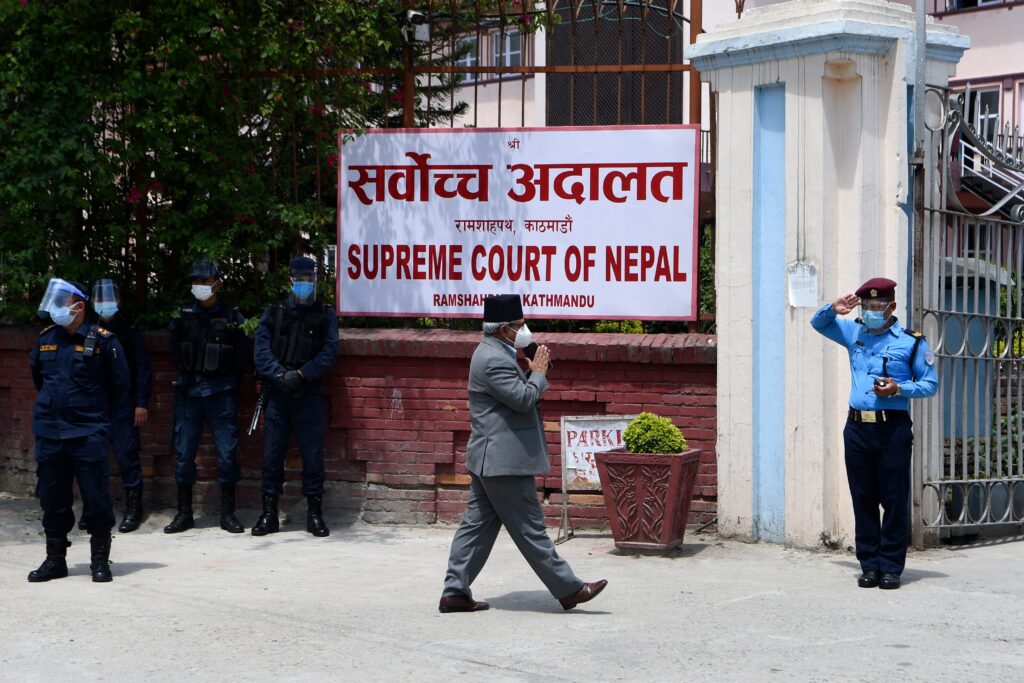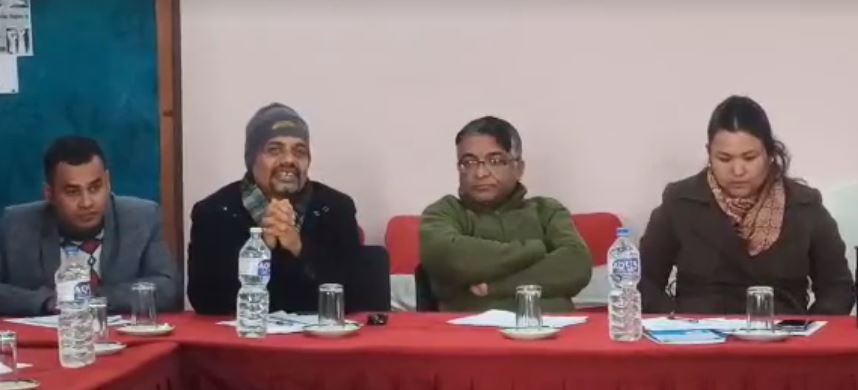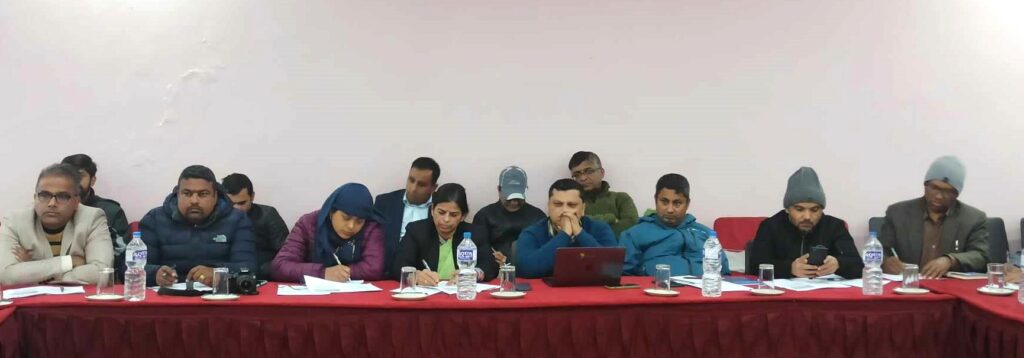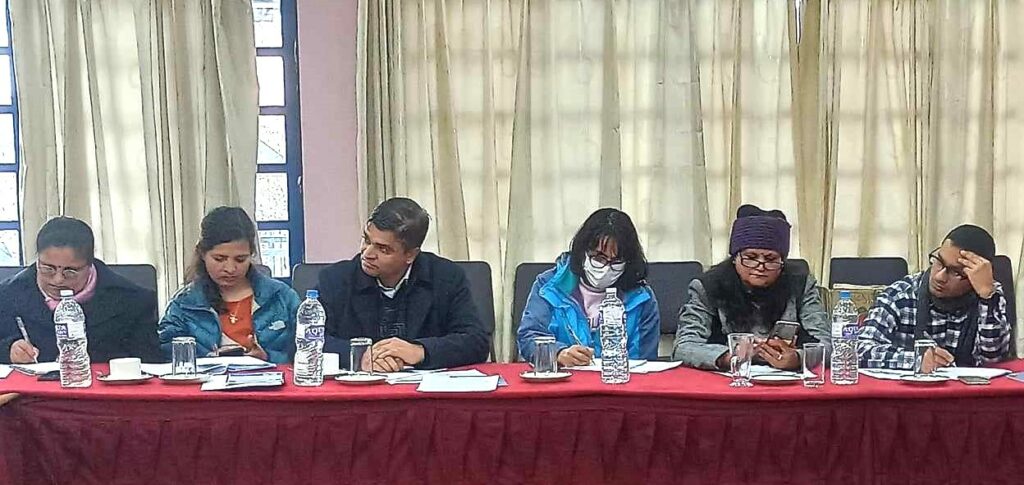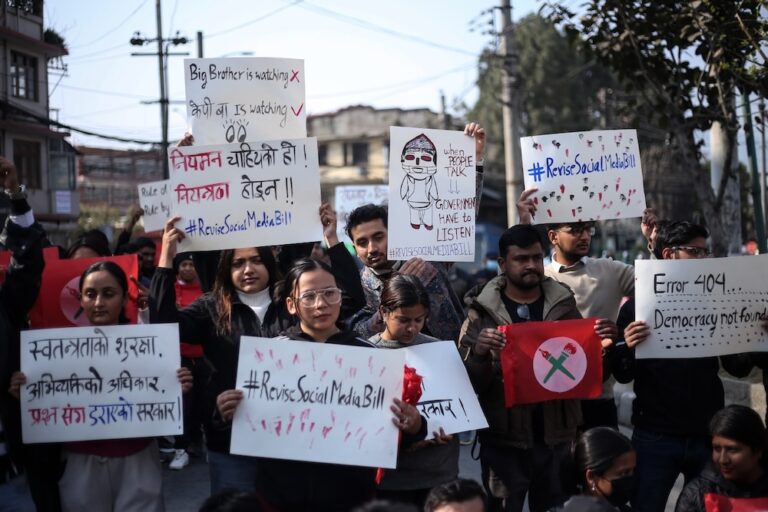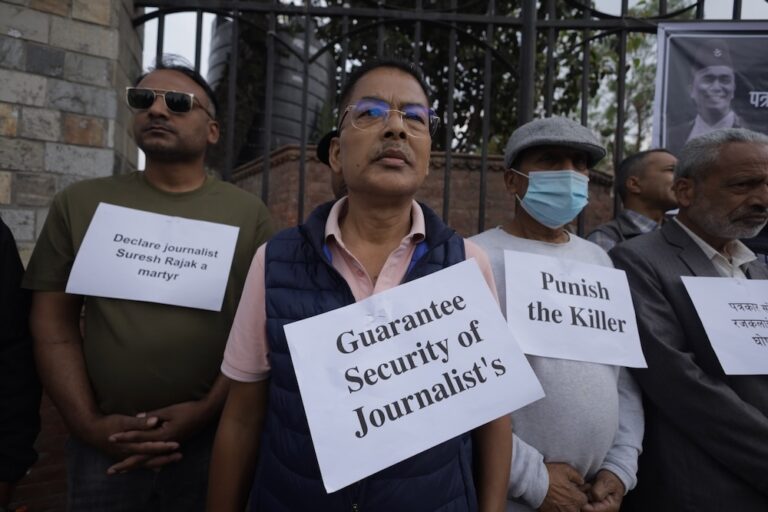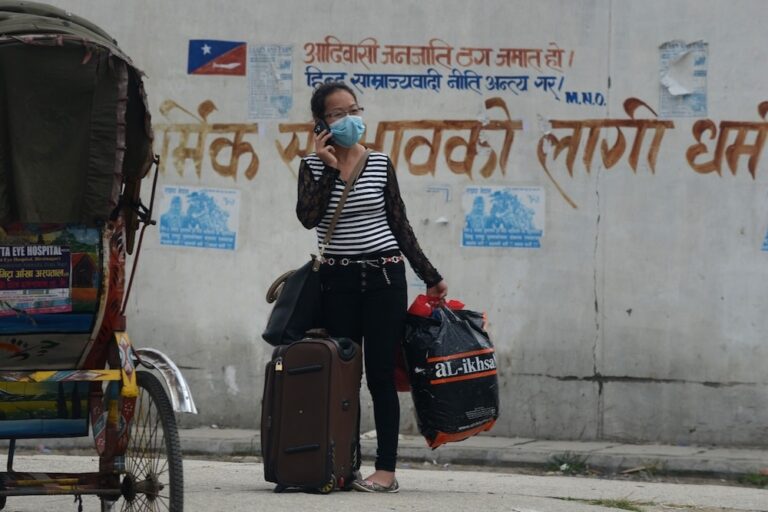A roundtable forum organised by Freedom Forum tackled pending cyber-related laws and their impact on freedom of expression.
This statement was originally published on freedomforum.org.np on 7 February 2024.
Freedom Forum organized a roundtable discussion on “Freedom of Expression Issues and Implementation of National Cyber Security Policy” in Kathmandu on February 4 in a bid to garner information from the government and stakeholders, especially on FoE issues and concerns surrounding cyberspace.
On this occasion, FF Executive Chief Taranath Dahal initiated the discussion, shedding light on the objectives of the event. He spoke on the delayed policy making process in Nepal. “As the winter session of the federal parliament is to begin next day, the discussion is held to build shared perspective on FoE issues on cyber,” he said, reminding that the government’s previous efforts on an information technology bill had failed to ensure FoE. Thus, activism and critical discussion on the issue is pertinent, he underlined.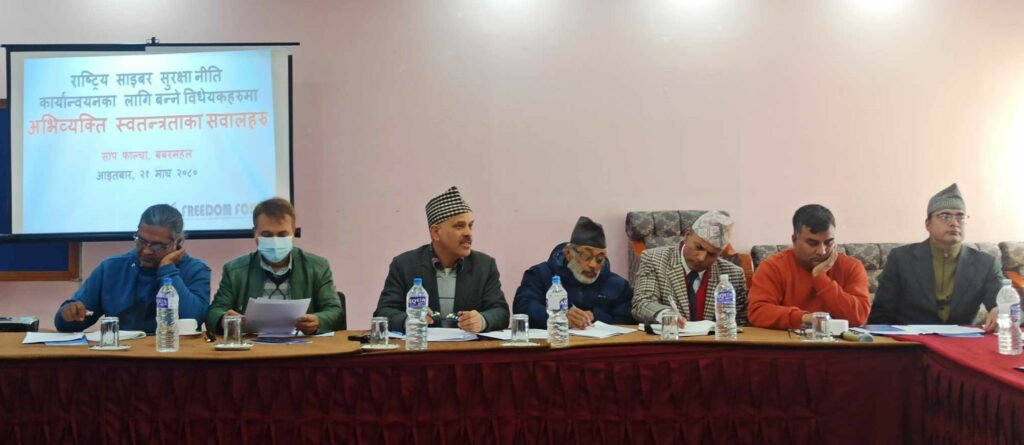
Following the context setting, Joint Secretary at Ministry of Communications and Information Technology Netra Prasad Subedi informed the participants about a pending bill in parliament and the bills in drafting process. While the Media Council Bill and National Mass Communication Bill are in priority for discussion, the Information Technology and Cyber Security bill is also being drafted, he said, adding that the Social Media Regulation Bill is most challenging at present, to build a unified stand on, he said.
“We believe the Social Media Regulation Bill should be contextual so we expect feedback on it,” Joint Secretary Subedi marked.
The Chairman at Nepal Digital Leads, Ananda Raj Khanal, expressed dissatisfaction over the policy drafting process. For the drafting policy, one should understand its ecosystem and components very well, and platform analysis is also important. “I would suggest to merge the IT and Cybercrime Bill and start from ‘zero’ by addressing concerns from stakeholders,” Khanal said.
Tanka Aryal from Digital Rights Nepal presented a brief review of the National Cyber Security Policy and the Social Media Regulation Bill (draft). “Thirty-five civil society organizations jointly submitted a memorandum on the draft bill to the Ministry. The bill aims at regulating contents and FoE online, where there is our strong reservation. It is okay to regulate platforms but while regulating contents citizens’ right to FoE must not be curtailed,” he expressed. The bill also contains criminalizing provisions, which are already addressed by other laws so this may be a dual threat to citizens, Aryal argued.
FF Chief Executive Dahal chimed in that criminalizing FoE practice using state power is a major development of serious concern in the draft bill. It is detrimental to democracy.
Referring to Dahal’s comment, Center for Media Research’s Ujjwal Acharya claimed the law making process in Nepal is anecdotal, it is not evidence-based. “I simply urge the government to at least address our concerns and recommendations in the bills during discussion sessions, to make us accountable and responsible in the policy making process. Also please let me know which provision in the bills show the state’s accountability,” Acharya remarked.
“We are backward in the policy making process, policy-level experts should map the legislative process with wider stakeholders’ consultation. Introspection is required in the law making process – whether the concerned law is required in developing a nation like Nepal,” said Chairperson at Media Action Nepal Laxman Datt Pant. “I would say principally the Social Media Regulation Bill should be nullified.”
Moreover, Anujraj Dhungel from www.technologykhabar.com added, “While the Nepal Telecommunication Authority is regulating online content these days, the government is preparing the draft bill to amend the NTA Act, but who is drafting it and how is yet to be known.”
“One should keep in mind the international commitments on FoE and human rights while drafting bills. UNESCO’s guidelines for governance of digital platforms is also a good reference,” said Prabesh Subedi, President at Digital Media Foundation. He further added that though TikTok is banned in Nepal, at least 40% to 50% users are active invisibly. “So, how will the state regulate this platform,” he questioned. Thus, the government should be open in the policy making process.
Senior journalist Namrata Sharma said that the government, the corporate sector and concerned authorities should be held accountable in the policy making process. The process should also address concerns of victims, survivors and vulnerable groups.
Similarly, Chairperson at NEFEJ Roshani Adhikari stressed that policy level experts should be capable and well acquainted with contemporary changes.
Advocate Ram Maya Lamichhane asked the authorities to clearly define hate speech while preparing bills. Its definition is ambiguous.
Chairperson at Jagaran Media Nepal Samjhana Pokharel opined that instead of drafting for the long-term, policies should be drafted in a phase-wise manner to address changing contexts.
Journalist Rajan Kuikel said that recent moves of the government, from banning TikTok to drafting cyber security and social media regulation bills, depicts authoritarianism which is harmful to civic freedoms.
FoE scholar Dr. Narayan Kandel shared that in accordance with western principles the provisions which do not have serious harm should not restrict citizens’ FoE. The gatekeeper principle in law making should be adopted in Nepal too.
Krishna Sapkota, Chairperson of VDRC, mentioned that the law making process should be multi-disciplinary, including the needs of vulnerable and marginalized population. Pre-legislative scrutiny is equally important where CSOs’ responsibility should also be more structured.
Technological expert Chiranjibi Adhikari complained that the government brings forth policies at the last hour, lacking multi-stakeholders’ consultation, resulting in ignorance of concerns and recommendations.
Under Secretary at Federal Parliament Secretariat, Numaraj Khanal, shared the practices of policy making and policy discussion processes in the parliament. He expressed concern over the lack of CSO participation in the pre-legislation period. Similarly, he said that while the government prepares policies, implementation depends upon bureaucracy. Sometimes, a law may have one spirit and its implementation may have a different effect, which brings conflict, he underscored.
Secretary at the Federal Parliament, Nirmala Devi Lamichhance, seconded Khanal, stating that wider multi-stakeholders’ participation is essential in the whole policy making process – from the pre-legislative to legislative to the post-legislative phase.
Summarizing all the participants’ voices, media educator Dr. Shree Ram Poudel commented that Nepal adopts a reverse trend of policy making process from constitution to policies. The analog mindset of lawmakers should be changed to identify current policy standards, the need of the hour and the public mandate. The emerging policies should be in line with new evolving dimensions.
FF Chief Executive Dahal further argued that FF’s major concern is that MoCIT should develop a standard format for protection of FoE in all the bills, in line with Nepal’s Constitution Articles 17, 19 and ICCPR principles.
After listening to all the participants’ comments and feedback on the bills, Information Ministry Spokesperson Subedi called the floor to provide appropriate suggestions to the ministry in future so as to make the policy making process more effective. He also expressed commitment to increase the stakeholders’ consultation in the legislative process.
Concluding the discussion, FF’s Chairperson Hari Binod Adhikari reminded the government that an inclusive and participatory law making process is the essence of democracy.
The program was attended by representatives from MoCIT, Federal parliament secretariat, civil society organizations, media educators, advocates, FoE experts, journalists and researchers. The total number of participants were 41, including 12 females.
